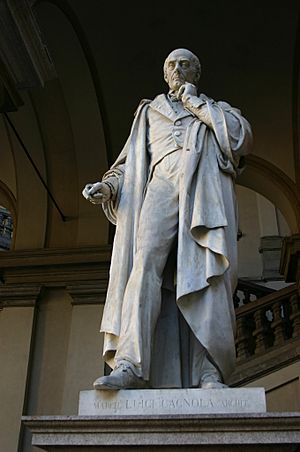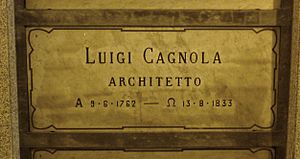Luigi Cagnola facts for kids
Luigi Cagnola (born June 9, 1762, died August 14, 1833) was a famous Italian architect. He designed buildings in a style called Neoclassical. This style was popular in his time and used ideas from ancient Greek and Roman art.
Contents
Luigi Cagnola's Life and Work
Luigi Cagnola was born in Milan, Italy. When he was 14, he went to study in Rome at the Clementine College. Later, he studied at the University of Pavia. His family wanted him to become a lawyer.
However, Luigi loved architecture much more than law. After working in some government jobs in Milan, he entered a competition. He wanted to design a new city gate called the Porta Orientale. His ideas were very good, but they were not chosen because they would have cost too much money.
Becoming an Architect
From that moment on, Cagnola decided to focus only on architecture. After his father passed away, he spent two years traveling. He visited Verona and Venice, studying the amazing buildings there. This helped him learn even more about design.
Famous Buildings and Arches

In 1806, Luigi Cagnola was asked to build a special arch. It was for the wedding of Eugene Beauharnais, a French prince, and a princess from Bavaria. The first arch was made of wood. But it was so beautiful that people decided to build a permanent one out of marble.
Work on this grand arch began on October 14, 1807. The final result was the magnificent Arco della Pace (which means "Arch of Peace"). It stands at Porta Sempione in Milan. This arch is huge, only a little smaller than the famous Arc de Triomphe in Paris.
Cagnola designed other important structures too. These include the Porta Ticinese and the Santa Marcellina chapel, both in Milan. He also designed the church tower in Urgnano.
Later Life and Legacy
Luigi Cagnola passed away in Inverigo, Italy, in 1833. This was five years before his greatest work, the Arco della Pace, was fully finished. He had built a beautiful villa for himself outside Inverigo. It was called Villa La Rotonda. One of his students, Francesco Peverelli, completed the villa after Cagnola's death.
See also
In Spanish: Luigi Cagnola para niños
 | Percy Lavon Julian |
 | Katherine Johnson |
 | George Washington Carver |
 | Annie Easley |


